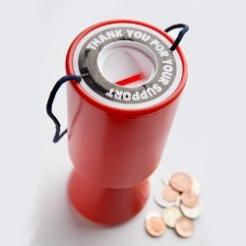Fundraising charities with incomes over £1m would have to join the FRSB, according to amendments proposed and later withdrawn at the committee stage of the Charities (Protection and Social Investment) Bill yesterday.
Labour peer Baroness Hayter of Kentish Town proposed the amendments yesterday at the second hearing of the committee stage of the bill.
The amendment went on to be withdrawn by Hayter, but she said she may reintroduce similar proposals at a later stage.
Hayter first suggested amendments earlier this month, along with fellow Labour Peer Lord Watson of Invergowrie, that all charities would have to register regardless of income, a suggestion which had received a lot of criticism.
Hayter, referring to the amendment as “Olive’s Law” after the debate over fundraising that emerged after the death of 92-year-old poppy seller Olive Cooke, said yesterday that their view is that existing self-regulation is not working.
She added that a third of fundraising charities are not even members of the FRSB.
She said: “The Fundraising Standards Board has not publicised its existence, meaning that those with complaints never took them to it, and it has not outlawed unacceptable practices.
“We have concluded that the time has passed for charities to be able to choose whether they want to join the Fundraising Standards Board, or to abide by the code of conduct set by the Institute of Fundraising.”
Wording to represent that there is a minimum level of income required – suggested to be £1m – has yet to be formally added in to the amendment.
Lord Hodgson of Astley Abbots, a Conservative peer, disagreed with the amendment, responding to Hayters suggestion by saying that “charities have the right to ask”, and “if they cannot ask, then the amount of fundraising that charities will be able to do will fall dramatically. That is balanced by the right of the public not to be unduly hassled. It is that nexus which we are seeking to find in any fundraising regulatory system”.
He added that the public “do not like any money being spent on fundraising”, that there is an “argument for explaining to the public that, in order to have effective fundraising, it is possible that you will need to pay someone money for it”. He said it was a “difficult philosophical balance to be established”.
He also noted that the legislation is very uneven, and that commercial collections “have no regulation whatsoever”.
Hodgson said that there reputational pride in individual charities, however “there is a real need for the sector to understand that it is judged by the weakest link”.
He added that there is also “a failure to see that the alphabet soup of regulatory bodies—the IoF, FRSB, the PFRA and the Charity Retail Association—is confusing to the public”.
He called for a single self-regulatory system of fundraising, called, for example, the charity fundraising authority. It would be responsible for producing national guidelines, and provide internal best practice for fundraising – “in particular about things like passing on names of donors to other charities”.
Transparency puts charities in the 'firing line'
Liberal Democrat peer Baroness Barker noted that “a fundamental problem for charities is that when they are open and transparent about their fundraising costs, they put themselves in the firing line for all sorts of comment”, which then makes them extremely reluctant to do so.
She said that she believes Hayter is right to “do her bit to up the temperature on the voluntary sector at this moment, but I am not sure she is absolutely right” that there should be statutory regulation of fundraising. She said she thinks the voluntary sector deserves a last chance to put it right, suggesting a time limit of a year to set up a new code of conduct and resolve the problem of too many fundraising bodies.
She said: “If the voluntary sector does not come forward with a new code of conduct within that year, the Government would be absolutely right to step in at that point and exercise their powers.”
Hayter went on to request to withdraw the amendment, to give an opportunity to find a way to come up with a comeback that “gets maximum support”. It was withdrawn.









